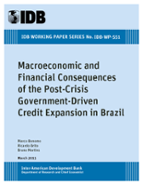Macroeconomic and Financial Consequences of the Post-Crisis Government-Driven Credit Expansion in Brazil
Date
Mar 2015
Government-driven credit played an important role in countervailing the private credit crunch in Brazil during the recent financial crisis. However, government credit concessions continued to expand after the economy recovered. This paper investigates some important features of this expansion using a huge repository of loan contracts between banks and firms, composing an unbalanced panel of almost 1 million firms between 2004 and 2012. The results show that larger, older and less risky firms have benefited most from the government-sponsored credit expansion. Additionally, although higher access to earmarked credit tends to lead to higher leverage, the effect on investment appears to be insignificant for publicly traded firms. Since interest rates on earmarked loans are lower than market interest rates, firms with higher access to this type of loan tend to lower the cost of debt.




